I came back last night from a weekend office trip to Shanghai, my first visit to China. Curzon, who has far more China experience than I do, gave me some words of warning before I left for Narita Airport: “Just remember, you’re visiting the nicest part of China, and it’s still the world’s biggest shithole.”
Shithole? Yes. Nice? Certainly. It’s a huge cow pie with flowers growing out of it. I always figured that China and Japan would have a lot in common, but it’s almost impossible to see: I returned from Shanghai with the impression that I had just been to Mirror Universe Japan, where the only commonalities are superficial, and deep down everything is exactly the opposite.
Come to mention it, they don’t even look that much alike.
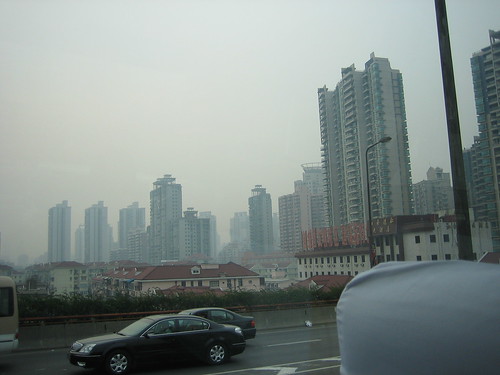
A representative image: smog and gazillions of tall buildings.
The first thing that you notice upon arrival at Pudong Airport is the shitty air quality. As I looked out the airplane window taxiing in, it was hard to see anything beyond the immediate terminal area, and even the other airplanes were obscured by a light gray haze. It’s certainly no fun to breathe, either.
Pretty much everything in Shanghai has been built within the past 10 years. It’s obvious that everything was a rush job. Coming from Japan, where everything seems to be built perfectly, I could spot the cracks, stains and uneven seams on every building in Shanghai, starting with the virtually brand-new airport terminal.
From a distance, though, these places look downright amazing, in terms of scale as well as shape. So many foreign architects have gotten contracts for thousand-foot skyscrapers and expansive shopping malls, and taken the opportunity to go hog-wild on design.
That said, there is no question that it’s still a developing country. The beautiful new glass buildings exist right next to ancient buildings that seem to be ready to fall down. You see quite a few scenes like this:
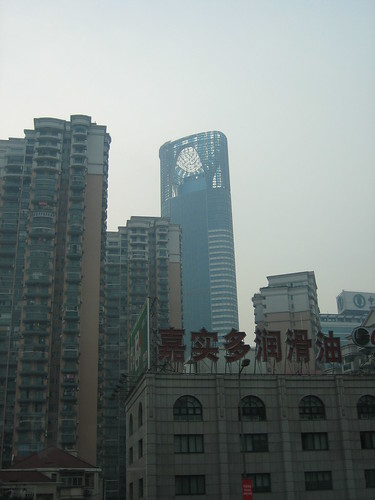
Lower classes omitted for clarity.
Subtlety is not one of the city’s strong points. Shanghai is in your face all the time: wealth, poverty, flavors, smells, waiters and beggars are all in your face. The way Chinese is spoken (i.e. very loudly and forcefully) adds to the effect, and makes Tokyo seem incredibly subtle in comparison.
At night, though, the city is absolutely spectacular. With a caveat: it’s spectacular in a completely dystopian science fiction kind of way. I have heard many people compare Tokyo to Blade Runner, but Shanghai is an absolute spitting image. I mean, just look at this.
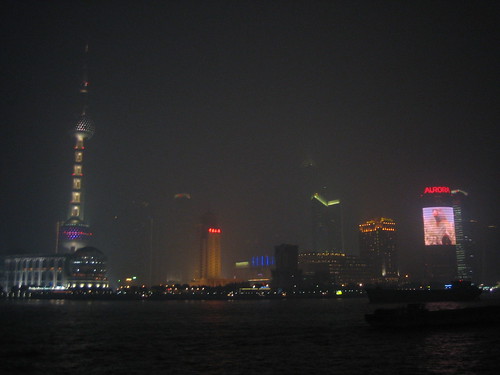
Brooding atmospheric effects: check. 20-story television screen cycling bizarro commercials: check. Flying cars: hmmm…
(Note than in the above picture, you can’t even see the Jin Mao Tower [the tallest building in China] except for a tiny hint of its pyramid-shaped top. That’s how bad the air is.)
The effect is even more pronounced when you’re riding down an expressway in a crowded Volkswagen Santana taxicab, surrounded by that seemingly endless field of skyscrapers which fade in and out of view as the air quality changes from bad to worse, with a new LCD television in one corner playing random Chinese music videos while the radio simultaneously blares a talk show, and the driver is going hyperactive on the other side of a flimsy-looking plastic shield. Not to mention the fact that conversations with people seemed to turn into that Blade Runner “gutter-talk”–a salad of pidgin English, the few Chinese words I know, and occasional bursts of Japanese where it seemed more applicable.
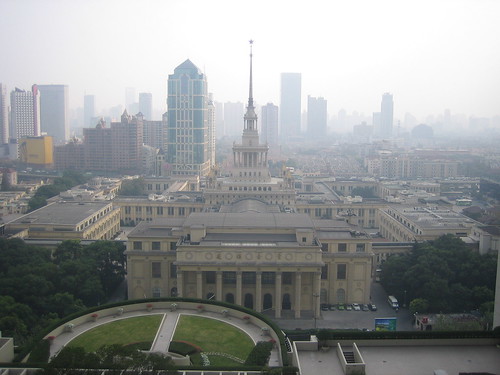
Another day in Shanghai, another mysterious-looking skyline.
The one thing that gets me after this trip is an odd irony. China is, at its heart, one of the most capitalistic places I have ever visited. Everyone is a hustler out to make a yuan, and those who make the most yuan love to spend it on themselves. There seems to be no social cohesion whatsoever. But the country officially (if not practically) follows communist ideals.
Yet in Japan, which is universally accepted as a capitalist democracy, few people seem to have much cutthroat business sense. Instead, the society expects people to support each other through family, school and company networks, and people seem to care more about their work product and relationships than their compensation. It seems like a perfect foundation for a socialist utopia: instead, it produced the second-largest capitalist economy in the world.
Being in Japan has gotten me used to contradictions, but this one might puzzle me for a while. While I ponder it, time to start learning Mandarin. After a few months of being polite in Japan, it’s quite tempting to head back to China and spend a week merrily screaming at everyone in sight.

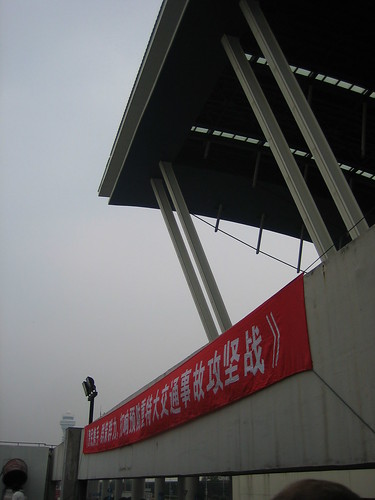
Nice travel post Joe. I saw all of the same vistas you did when I was there just a couple of years ago, and the skyline is already radically different. That giant TV? Definitely new! And while most of the other buildings were there, they didn’t have all the awesome lighting installed yet.
Oh, and “field of skyscrapers which fade in and out of view” sounds like a video game on the N64.
I visited Shanghai back in August and I had pretty much the same reaction. News media had given me the impression that it would be like Tokyo, but man, what a shithole. I almost got hit by spit and trash several times. I thought Japan had ugly cities with stained concrete and powerlines everywhere, but man…
This post brings back memories for me. I did the opposite of what you just did. I lived in Shanghai (and other parts of China) and then I visited Tokyo and Japan for the first time. All I can say is that if you guys think Shanghai is a shithole, don’t ever go anywhere else in China. You wouldn’t last 5 minutes. Shanghai is probably twenty times more developed, modern, and pro-western (if you can call it that) than most of the rest of the country.
I didn’t personally think that Shanghai is a shithole at all, although some of the other cities I saw in China would meet the criteria. People just need to realize that despite all the hype, China is still a developing country. Remember all the environmental problems Japan had in the 60’s and 70’s.
To be fair, I would also characterize the entire I-95 corridor between Washington and New York as a shithole; that hasn’t stopped me from spending extended periods of time there, and actually kind of enjoying it.
In fact, I would characterize pretty much all of Washington as a shithole myself.
Come on, everyone knows that LA is the shithole.
Hartford is pretty hole-ish too.
From Friedman’s column in today’s NYT:
I used to catch a whiff of field fires on the train from Kyoto to Osaka, but I guess he’s talking about something much more severe.
“I returned from Shanghai with the impression that I had just been to Mirror Universe Japan, where the only commonalities are superficial, and deep down everything is exactly the opposite.”
————
Exactly my feelings on going to China for the first time this year. Except that apart from looking somewhat alike, and writing vaguely alike, the commonalities don’t even seem to rate a ‘superficial’. Taking the train into Shanghai (from a regional city) was an eye-opener in many ways, not least of which was Middle-Class Suburban Shanghai: massive areas of IDENTICAL housing going on for what seemed like miles, and very very new. But the biggest eye-openers were the traffic (words fail me: in fact in the China Daily or whatever it was on the flight back there was a column about the very same thing) and the stroll I took with my GF down some of the back alleys of the old Chinese city at night. Yikes. And then we came out to the main road and got a view over the river to the illuminated skyscrapers of Pudong. Koizumi’s Japan and its “kakusa shakai” has NOTHING on this. Over the years I have often wondered if I should have been a China specialist rather than a Japan specialist. No longer. China and Japan are *nothing* like each other. And, more to the point, while I admire and respect much of Chinese history and culture, there was nothing there that really connected.
However I don’t think Shanghai is a shithole in and of itself. It needs a TON of work, I kept thinking the real reason the Japanese invaded was to teach them some manners, traffic is insane, the air is so filthy I didn’t even bother going to any of the tall towers (I was there in summer: it was 35+ each day and the air was like breathing miso soup, only not as nice) and the hype is way over-hyped, but it’s far from a shithole (aside from the actual shitholes in the old Chinese city, of course). Dirty, crowded, and far more people who will try and scam you for being a foreigner (can’t walk three steps down Nanjing Rd without someone coming up to you trying to sell fake watches and bags – oh, and Japanese Customs were *really* strict getting back in for that very reason), but not once did anyone ever seemed fazed when a gaijin walked into a restaurant, nor did they gasp when I wrote kanji (my written Chinese is better than my spoken: neither are remotely ‘good’ though). It seems (based on a very limited experience mind you) that Chinese are like Americans in that they consider anyone in China should know Chinese, or at least be trying to know it. That Chinese seem to think everyone else should be like them, and the Japanese that no one else should. Terrible generalisations, I know. But if anyone does know much more about the comparative ex-pat experience (preferably not the JET-pack sort of Utter Ignorance and Contempt) I would be very interested to hear.
While I think this is an OK perspective in that first-time-in-China kinda way, you missed out on the best thing about Shanghai – the Shanghainese. Before you laugh spend a few years living here and get to know the people, and learn some Chinese (Shanghainese+1). Once you look past the spitting, hawking, loud speech (most of these people are not Shanghainese I assure you) and rampant materialism, you’ll come to appreciate their dynamism, openness, and enthusiasm.
I, for one, will take uncouth but friendly Chinese over Japanese any day….and the traits attributed to Chinese could easily be used to describe the average American. (Ignorance about other cultures, thinking we are the center of the world, expecting everybody to speak Americ…whoops I mean English). Hell yeah it’s a developing country. It’s clear that the problem is more about your expectations before you came here (you wanted a Chinese Tokyo, wrong place my friend, try Taipei or HK) than with Sh itself. Pollution is a no-brainer. Some of the fog you observe is man made pollution, some of it is, well, fog. The climate here is humid/damp, fog happens.
China is a country of 1.3 billion, Japan 127 million. China began industrializing in the 1980s. Japan began in the 1880s. China is still 80% rural with an agrarian economy.
For anybody who has traveled in Africa, India, or other developing parts of the world, nothing in China is shocking, except for the sheer scale of things. Are some people out to scam you? Sure. As with anywhere that has poverty. Are the majority of Chinese honest and helpful. You bet. Are the majority of foreigners in Shanghai arrogant douchebags or degenerate buggers? Yup.
Nice post – I had a similar feeling the first time I went from Tokyo to Shanghai. Even though it’s a bit dirty, there is something freeing about the relative lack of manners compared to Tokyo. I also wonder how things are changing in Shanghai in the last year since the Chinese economy has been having trouble.
I haven’t been to China since 2004, which was shortly before I started learning Chinese, and about a year and a half before I went to Taiwan to really study Chinese. I’m very much looking forward to going back some time both to see what’s changed, and to see how different it feels to me when I can actually converse (to a much more limited degree than I can in Japan) with random people. Hopefully I can make it this year.
Just came back from Shanghai.And the whole trip was a deja-vu thanks to this post.
One thing I’ve noticed as the huge difference is the amount of American cars(or the localized version of)running the city.Lots of Buick and Chevy.Even wonders why Detroit big three is in the brink of bunkruptcy
Totally coincidental, but on Monday at the park by my house, a guy pulled up in a pimped-out 60s-vintage Impala with rapper-style hydraulic lifts. He was instantly popular with all the picnicking kids.
Having recently watched “Gran Torino” I too want 70’s big American gas-guzzler.
But the Chevys and Buicks that I saw in Shanghai looks like…Like Korean car.
Ofcourse there must be some localization to fit the needs,but that’s no Buick I had in mind.Anyway the street is filled with cars from all nationality that is imaginable.
Kia,Hyundai,Citroen,Skoda,Fiat,Volvo,you name it.And that too can be a difference between Tokyo where the streets are dominated with Japanese cars.
Of course, a lot (most? all?) of those cars are actually made in China.
A friend of mine in Beijing once got into an argument with a Chinese guy who insisted that his Chinese Toyota was not a Japanese car (they use a “Shanghai” brand in China, but the logo and body styling are the same).
I’m thinking about watching Steven Spielberg’s 1987 film”The Empire of the Sun”again during GW to commemorate J.G Ballard who had recently passed away and also to confirm how things had changed over two decades in the outlook of Shanghai and Christian Bale.
Your comments about Japan at the end is….quite superficial and incorrect. It’s difficult to really understand the Japanese society unless you become part of it, but clearly, you are not, at least not at the moment.
This is the most accurate account I have read about Shanghai. I lived in Nagoya and now live in Shanghai so I have some perspective on the place and comparison you make.
After living here for 18 months now, it’s definitely time to go. I’ve never liked it and to be quite honest anyone who claims to love the place I consider to be deranged. I have enjoyed living here but mainly from a voyeuristic point of view I can’t wait to escape.
Thanks for the write up I’m glad to know I’m not alone.
As a Hong Kong Chinese, I find China an extremely distressing and excruciating place to visit, because I know this so-called “motherland” too well. Everywhere I see, I imagine what could have been. But instead, so many wonderful things inherited from the past has been tragically destroyed by the communist China. This is something foreigners will never be able to understand unless they take some time to study a bit of Chinese history.
But one needs not do that to know China is not a place to settle in. The horrendous air quality, the rude, uncivilised “citizens” are among a myriad things to put you off.
I usually put aside my prejudices when I travel (if not, why bother to travel), but China remains one of the most difficult places for me to actually enjoy. Simply because it’s laden with too many problems.
While that skyline in Shanghai might wow some, I find it nothing special. That tower on the left looks ugly to me. Hong Kong’s skyline looks one million times better.